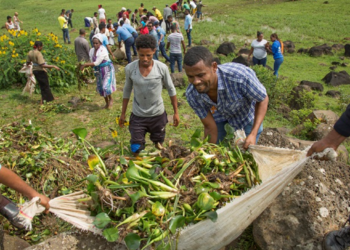Invasive species ecosystems and fish supply chains under attack – Invasive species never come alone: they bring with them ecological instability, economic crises and the inevitable test of maturity for those who manage resources and territories. The recent spread of golden mussels in California confirms how organisms with a high adaptive capacity now represent a major threat to aquatic ecosystems and related production chains.
Native to China and South-East Asia, golden mussels first appeared in North America in October 2024, along the Californian coast. Unlike the already well-known quagga and zebra mussels, these newcomers are distinguished by their superior danger: their ability to survive in a wide range of aquatic conditions makes them particularly difficult to contain. This is therefore not just a localised invasion, but a potential uncontrolled expansion that could involve reservoirs and strategic infrastructure.
California’s response, with the adoption of an emergency regulatory framework and enhanced monitoring measures, comes as the species has already taken hold. A script already seen, reflecting reactive rather than preventive management.
In Italy, the experience with the blue crab tells a similar story, but on a larger scale and with already consolidated impacts on shellfish farming and lagoon fishing. The extreme adaptability of this species has rendered late interventions ineffective, turning what had been perceived as a temporary emergency into a permanent condition.
The common thread linking California and Italy is the underestimation of the systemic risk posed by alien species. These are no longer occasional phenomena, but dynamics closely linked to the globalisation of trade, climate change and the lack of shared protocols on an international scale.
Without integrated governance, the blue economy will continue to suffer setbacks from each new biological introduction. There is a need to shift the focus from consequence management to the construction of a prevention network, capable of identifying threats at an early stage and activating coordinated responses between institutions, research and operators in the sector.
The case of golden mussels highlights how future invasions will be characterised by species that are increasingly resilient and difficult to eradicate. In this scenario, Italy has the opportunity to go from being a victim of fragmented management to a reference model for containment and adaptation policies.
Getting ready means investing today in advanced monitoring tools, sector training and transnational collaboration. Because the next invasive species is not a remote possibility: it is already on its way.
Invasive species ecosystems and fish stocks under attack








